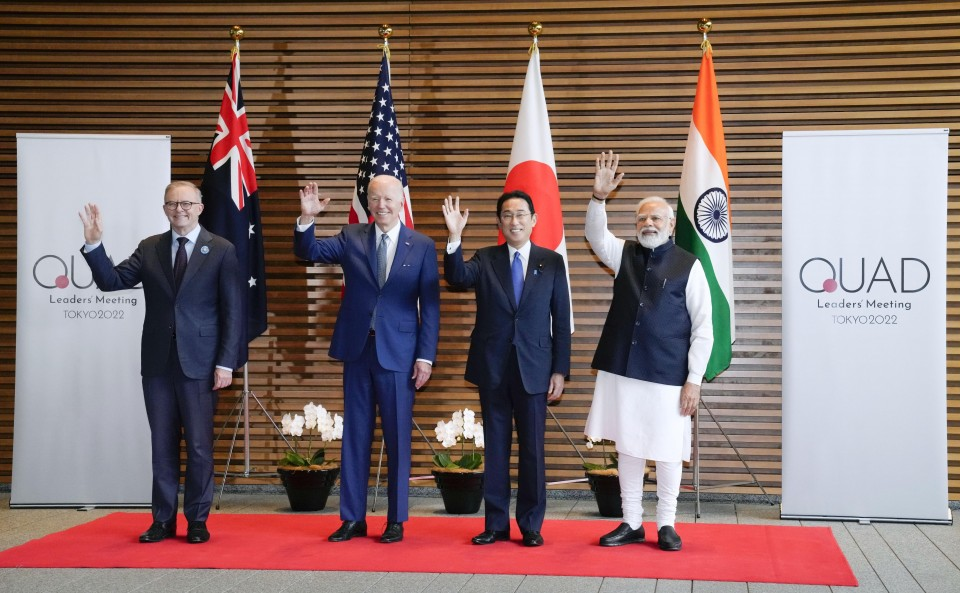That the Quad (Quadrilateral Security Dialogue, QSD) riles China almost on an everyday basis is an indirect acknowledgement of the appeal of its four attributes: Versatility, acceptability, elasticity and viability for many other nations and groupings.
Characteristically, Chinese echoes of the spectre of the Quad as a threat to peace and good order were heard in commentaries coinciding with the recent Shangri La Dialogue, at a time when the Quad seems to be coming into its own.
At least four ironies stand out. First, regardless of the “tsunamic” origin of an impromptu and informal Quad that provided regional succour in the immediate aftermath of the December 26, 2004, oceanic waves, it is China that has been the trigger as well as the glue for it to acquire greater relevance several years on. Second, the two older formulations in which China wishes to be counted as primus inter pares, BRICS and the SCO have not seen any significant growth, despite attempts at expansion within the Global South and the larger numbers in the Shanghai grouping. Third, Quad leaders have not had to sell the grouping as an anti-China formulation and have not done so. That is a well-thought-out restraint.
The fourth irony is that China’s rhetoric about Quad being an “Asian NATO” — focused against China — seems to have run its course. Its periodic attempts to write obituaries on the Quad’s demise do not have traction except, in some capitals tilted towards China. The Quad began as a provider of relief and, especially in the past two years, is expanding its range of public goods. It is orchestrating these without stepping on others’ toes, enhancing its appeal.
The Quad’s Humanitarian Assistance and Disaster Relief (HADR) origins are important, but its evolving roles matter more. It is difficult to think of any other formulation that covers such a slew of initiatives for regional benefits. These range from vaccines, partnerships for cable connectivity and resilience, cooperative maritime domain awareness, infrastructure development and investors’ network, to name a few. ASEAN as an institution, and individual members within it, have shifted in their approach to the Quad due to its versatility. The Indonesian President recently said, “We should view the Quad and AUKUS as partners, and not competitors … ASEAN’s aim is to make the region a stable and peaceful one.” The change in tack is significant. The Quad’s acceptability is growing and Indonesia is a key Indo-Pacific nation. The Quad’s stress on freedom of the Indo-Pacific, resisting unilateralism and respecting sovereignty have wide appeal.
On the other hand, China’s behaviour is sharpening anxieties across the Indo-Pacific, pushing many away from its earlier appeal, even as Beijing’s influence remains considerable. Despite the chequebook it carries, BRI investments, its growing role in dozens of national economies, aggressive diplomacy and growing military power, China’s stock is not quite what it was just five years ago.
So, over time, the Quad has become more acceptable because of its versatility; but, it also has the attributes of elasticity and viability. (can take out) Unlike the SCO, BRICS and even NATO, the Quad does not have a Secretariat or a designated, exclusive officialdom. This may change when its many programmes get going. Right now, the slew of initiatives mentioned are being lined up short of the starting blocks. Unlike BRICS, SCO, NATO or even the BRI, there is as yet little need felt for the QSD to expand, nor is there any canvassing to sign up new members. Unlike other formulations, the greater informality of the Quad enables it to span a wide spectrum of work areas that directly and indirectly aid human-security goals. It doesn’t need to be inclusive in its membership because it’s inclusive in its agenda. Unlike other multi-national formulations, Quad does not have a head-honcho nation even when the four democracies are of different sizes, with different national and economic problems to resolve. India, additionally has a major continental/strategic problem at hand, so unlike the other three Quad members, it is a “continental-maritime democracy.”
Apart from the four previously mentioned, consider the fifth attribute that Quad provides: Security. This has always figured in the full nomenclature of the Quad. While the word may have raised some anxieties and helped China leverage the propaganda of Quad being the “Asian NATO”, many countries realise that the grouping’s members can assist in enhancing a spectrum of security needs in new dimensions like cyber, space and other technologies. They simultaneously observe that Quad members have an effective degree of mutual military partnerships without all being allies. India’s position on alliances echoes some part of the US’s stand in 1917 on remaining an Associated rather than an Allied Power. This, inter alia, helped in making it acceptable and feasible for a few more Latin American nations to support the US and the Allied powers in small or symbolic ways. The QSD can contribute to an informal coming together of many countries so that conflict against one may be deterred. We have to imagine the nearly infinite geometrical shapes a Quad can form to get a sense of its growing future appeal and utility.
Source : IndianExpress











